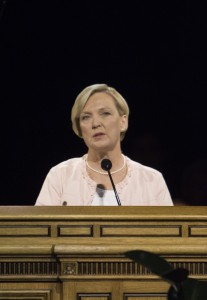The work of knowledge is a developmental process that is ongoing throughout our lives, in which goal-setting and faith in God, Jesus Christ and oneself are necessary for the success the Lord desires for his children, said Peggy Anderson at Tuesday’s BYU devotional.
Anderson, an associate professor in the BYU College of Nursing with 30 years of experience in the healthcare field, shared her personal experiences with education with BYU students. She encouraged students to be diligent in pursuing knowledge, setting righteous goals to reach personal potential, having well-rounded faith and friendships and preparing for service.

Anderson emphasized that the Lord desires success in all aspects of the lives of students by sharing a blessing she received.
“He desires your success in all aspects of your life — in your profession, in your education, in your family, in your relationships,” Anderson said. “The Lord desires your success.”
Doctrine and Covenants 88:118 says to seek learning by study and by faith. Anderson presented her own translation of that scripture to aid students in applying it to their personal lives.
“In my mind this translates to being diligent in pursuing knowledge and obedient in applying my learning to righteous purposes as I exercise faith,” Anderson said.
Anderson’s preparation for her career in healthcare led her to learn theories about human development. She related Erik Erickson’s psycho-social development theory to pursuing an education. Erickson’s theory highlights the various stages of human development over a lifetime. She said the work of knowledge is a developmental process that occurs over the course of life.
“… Over time I grew to recognize the beauty of knowledge and intelligence, the empowerment of education and the importance of spiritual faith coupled with secular learning,” Anderson said.
Anderson explored how this type of education can lead to opportunities to be a better person. One key element to becoming a better person that Anderson addressed was goal setting.
“I feel that when goals are combined with faith and reason, they empower us throughout all life stages as we seek to resolve many of the developmental conflicts,” Anderson said. “Goals enable us to engage our minds in righteous endeavors and motivate us to be a better person.”
She referenced an article written by Elder M. Russell Ballard, who also addressed this issue. Anderson echoed Elder Ballard’s encouragment for individuals to have faith in themselves to reach their potential.
“I am so thoroughly convinced that if we don’t set goals in our life and learn how to master the technique of living to reach our goals, we can reach a ripe old age and look back on our life only to see that we reached but a small part of our full potential,” Ballard said.
Anderson shared her experience as a single mother for 25 years. She recalled that the goal she set to raise a righteous family motivated her to continue her education by trusting in the Lord even when it seemed most challenging. Anderson said she prayed for a friend as she continued her education because she said she knew she would not be able to survive her educational journey without one.
“It has also made me aware of the importance of having a good friend as you pursue your goals in life,” Anderson said. “I hope that you will join me in my prayer that you will each find a good friend and be a good friend.”
At a time when Anderson felt exhausted from her work and school load, she said the BYU motto, “Enter to learn, go forth to serve,” inspired her. She offered Elder David A. Bednar’s insight to that motto to encourage students to go forward with faith.
“Enter to learn to love learning and serving; go forth to continue learning and serving,” Bednar said.
After graduating with her master’s degree Anderson understood why the prompting came to her so strongly that she did not need to pursue a doctorate degree for the service she would render next. She was called to serve as the Relief Society president at the Utah State Prison a few months after her graduation.
“It was a deeply spiritual experience,” Anderson said, “a unique opportunity that required me to serve with all of my ‘heart, might, mind, and strength’ (Doctrine & Covenants 4:2) — one that continually reminded me of our divine heritage and the love that our Heavenly Father has for us.”
It was later as a teacher that she said she recognized she was teaching divine children of God.
“The Spirit bore witness that I teach among spiritual giants and dearly beloved children of our Heavenly Father,” Anderson said. “I was reminded once again of the spiritual gifts offered to each of God’s children, the power of the Atonement, the importance of setting wise goals in all areas of our lives and the empowerment of education.”




